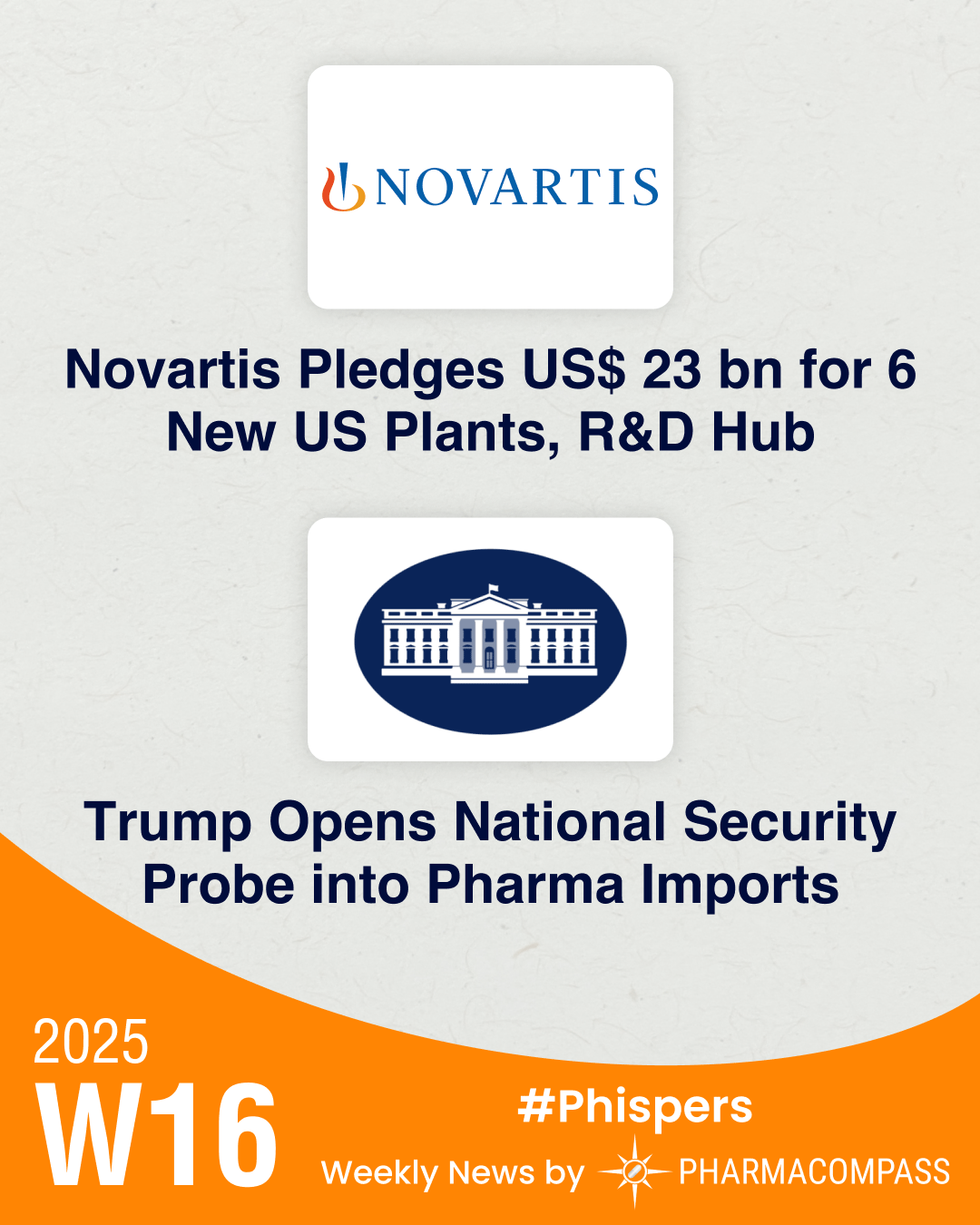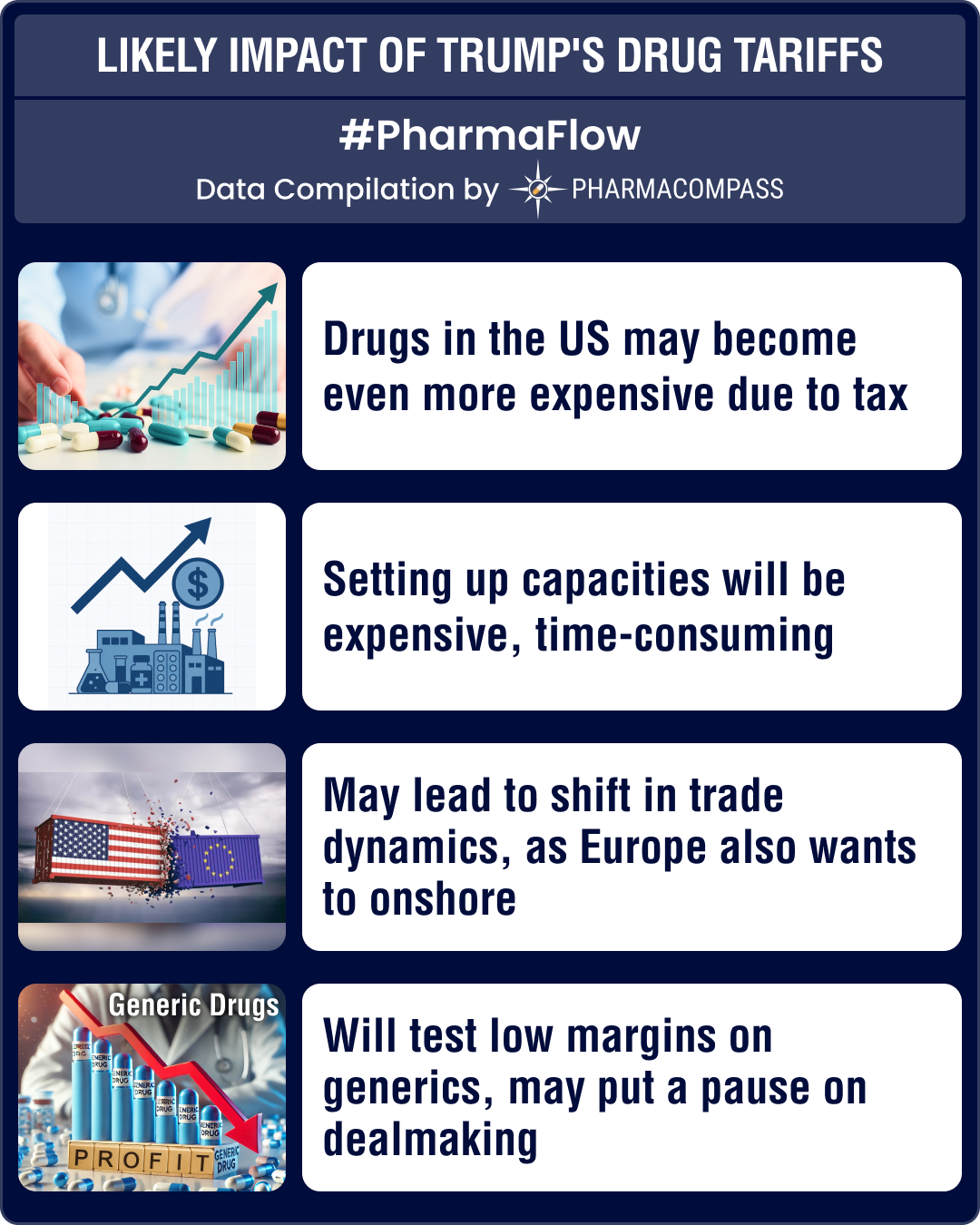
By PharmaCompass
2025-04-17
Impressions: 565 (Article) || 1 (Video)
After Eli Lilly and Johnson & Johnson, Novartis has become the latest big pharma to announce mega investments in the US. The Swiss pharma giant announced a US$ 23 billion investment to expand its US operations.
On the heels of US President Donald Trump indicating ‘major tariffs’ on imported drugs, nearly three dozen global drugmakers urged the European Union to implement reforms to retain their operations within the bloc. They highlighted the economic challenges they face in Europe compared to the US market where their drugs sell for a much higher price.
Trump signed a sweeping executive order reshaping Medicare drug pricing negotiations. It could allow states to import lower-cost medications from Canada.
Pfizer discontinued its experimental oral weight-loss pill danuglipron following a case of potential drug-induced liver injury, setting back its entry into the competitive obesity treatment market.
On the legal front, Sandoz filed an antitrust lawsuit against Amgen, alleging the company used a “thicket of patents” to block US access to Enbrel biosimilars that have been available in other regions for about a decade.
Spruce Biosciences acquired global rights to tralesinidase alfa, an enzyme replacement therapy for Sanfilippo syndrome type B, reviving prospects for the treatment of this rare genetic disorder.
Novartis plans to invest US$ 23 bn in six new plants to onshore all drugs for America
Novartis has announced a US$ 23 billion investment to expand its operations in the US over the next five years. This initiative includes the construction of six new manufacturing plants and a research and development center in San Diego, California. Two of the manufacturing facilities will focus on next-generation cancer therapies and will be located in Florida and Texas.
The investment is expected to create over 1,000 skilled jobs within Novartis. The Swiss pharmaceutical giant’s goal is to produce all its drugs for the American market domestically, CEO Vas Narasimhan said. This announcement comes amid renewed threats from Trump to impose “major” pharma tariffs soon.
US govt probes pharma imports; ‘tariffs may disrupt drug supply,’ warns J&J CEO
The US President Donald Trump has launched a national security investigation into pharmaceutical imports, signaling the potential imposition of tariffs of 25 percent or more on foreign-made drugs. The move aims to reduce reliance on overseas manufacturing and bolster domestic production, particularly in critical sectors like pharmaceuticals and semiconductors.
Meanwhile, Joaquin Duato, CEO of Johnson & Johnson, has cautioned that tariffs could lead to drug shortages and advocated for tax policy reforms to encourage US manufacturing instead.
‘US govt to cut US$ 40 bn from HHS,’ says report: Trump administration is planning to slash around US$ 40 billion in funding by the Department of Health and Human Services (HHS), a Washington Post report said, citing a preliminary budget document. In fiscal 2024, HHS had a discretionary budget of about US$ 121 billion. The proposed cut will reduce the budget by a third.
Drugmakers call for reforms to stay in EU: European pharmaceutical companies are urging the European Union to implement reforms to retain their operations within the bloc, as the US considers imposing tariffs on imported medicines. In a letter addressed to European Commission President Ursula von der Leyen, nearly three dozen global drugmakers — including Pfizer, Eli Lilly, and AstraZeneca — highlighted the economic challenges they face in Europe compared to the US, where drug prices are significantly higher. They requested compensation for innovation costs and called for streamlined regulatory requirements, such as simplifying multi-country clinical trials. Additionally, they criticized an upcoming EU fee for treating wastewater from micropollutants.
Trump signs sweeping executive order to revamp Medicare price negotiations
Trump signed a sweeping executive order designed to reshape Medicare drug pricing and expand measures aimed at lowering prescription costs. Central to the order is a change in Medicare negotiation policy: small molecule drugs, which currently become eligible for price negotiation after nine years on the market, will have their eligibility delayed by an additional four years — bringing them in line with the 13-year waiting period for biologics.
Proponents argue this delay will safeguard pharmaceutical innovation from premature competition, while critics contend it postpones much-needed savings for consumers. However, the White House claims the order is intended “to eclipse the 22 percent in savings achieved in the program’s first year” under President Joe Biden.
It also calls on the FDA to streamline the approval process for generics and biosimilars, aiming to boost market competition and drive down prices. The executive order further seeks to broaden state drug importation programs, which could allow states to import lower-cost medications from Canada. These measures set the stage for negotiations on 15 high-cost drugs, including popular medications like Ozempic and Wegovy (both semaglutide).
Pfizer halts development of GLP-1 weight-loss pill danuglipron after liver injury case
Pfizer has announced the discontinuation of its experimental oral weight-loss pill, danuglipron, following a case of potential drug-induced liver injury in a clinical trial participant. Danuglipron, a glucagon-like peptide-1 (GLP-1) receptor agonist, marked Pfizer’s bid to enter the competitive obesity treatment market dominated by Novo Nordisk’s Wegovy and Eli Lilly’s Zepbound (tirzepatide).
Sandoz files anti-competitive lawsuit against Amgen over preventing Enbrel copycats
Sandoz has filed an antitrust lawsuit against Amgen in the US District Court in Norfolk, Virginia. The lawsuit alleges that Amgen engaged in anti-competitive practices to maintain its monopoly over arthritis drug Enbrel (etanercept), thereby preventing the entry of biosimilar competitors like Sandoz’s Erelzi.
The Swiss pharmaceutical company contends that Amgen employed a “thicket of patents” to extend Enbrel’s market exclusivity through 2029, despite the FDA approving Erelzi in 2016. This strategy, according to Sandoz, has denied US patients access to more affordable biosimilar options. In 2024, Enbrel generated US$ 3.3 billion in US sales.
Spruce acquires rights to BioMarin’s rare disease therapy after FDA stance change
Spruce Biosciences has acquired global rights to tralesinidase alfa (TA-ERT), an enzyme replacement therapy developed by BioMarin Pharmaceutical, for the treatment of Sanfilippo syndrome type B (MPS IIIB). TA-ERT is designed to address the deficiency of the enzyme alpha-N-acetylglucosaminidase in patients with MPS IIIB, a rare and fatal neurodegenerative disorder.
Allievex ceased operations in 2023 due to misalignment with the FDA. Allievex noted that the FDA shifted its stance in March 2024, even encouraging its former team to pursue approval. This deal positions Spruce to seek accelerated approval based on existing data, potentially earning a priority review.The PharmaCompass Newsletter – Sign Up, Stay Ahead
Feedback, help us to improve. Click here
Image Credit : Phisper Infographic by PharmaCompass license under CC BY 2.0
“ The article is based on the information available in public and which the author believes to be true. The author is not disseminating any information, which the author believes or knows, is confidential or in conflict with the privacy of any person. The views expressed or information supplied through this article is mere opinion and observation of the author. The author does not intend to defame, insult or, cause loss or damage to anyone, in any manner, through this article.”








